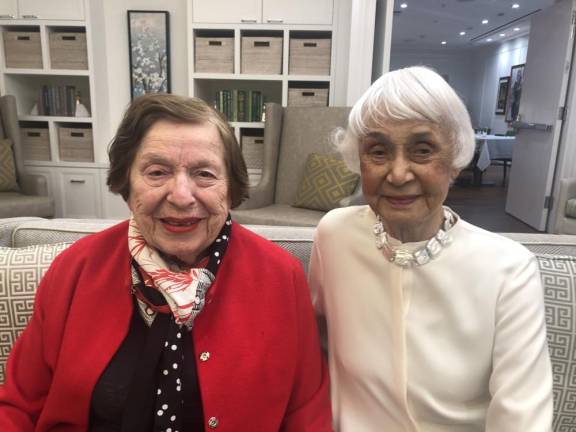Two Women, Pals for Over 50 Years, Reflect on Husbands, Careers and Life in Their 90s
Both women knew one another in the 60s in their native Michigan and reconnected when their respective husbands’ jobs landed them in New York. Now both in their 90s and living they reflect on long lives well spent as published authors, philanthropists and cultural mavens.

Forget pop culture’s version of the female friendship with its BFF hashtags, girls’ trips, and constant comparisons to SATC characters.
Dolores Wharton, 96, and Barbara Fleischman, 99, who have known each other for 50 years, say it’s all about mutual respect, mutual interests, and a shared passion to do for others.
New York native Dolores and Detroit-born Barbara, met in Michigan in the 1960s Michigan when they traveled in the same professional and cultural circles. “We’re rather sophisticated women,” notes Dolores.
They reconnected in NYC in the ‘70s when they found themselves neighbors at the prestigious United Nations Plaza. Both had relocated for their husbands’ jobs. Barbara’s late husband of 69 years, Lawrence Fleischman, was a partner in Kennedy Galleries–a leader in American art dealings. Dolores’ husband of 74 years (and counting), Clifton R. Wharton, Jr., was chancellor of the 64-campus State University of New York system. Says Barbara, “Dolores and I married remarkable and encouraging men. We were lucky.”
“Yes,” agreed Dolores, but reminded her friend that, “We also brought a lot to the table.”
Wharton retired as the chairman and CEO of The Fund for Corporate Initiatives, Inc., a non-profit organization she founded to strengthen the role of minorities and women in the corporate world. During the course of her illustrious career, she also held the posts of corporate director, foundation executive, and arts advocate, as well as serving on many boards often as the first woman and first African American. Additionally, President Gerald Ford appointed her to the National Council on the Arts.
“Dolores has done remarkable things,” says Fleischman, who was a professional volunteer, an art dealer, collector, and philanthropist. She was the first Jewish trustee of The Frick Collection, and also has supported and served on the boards of The Archives of American Art, The Metropolitan Museum of Art, the Julliard School, The Museum of Modern Art, the New York Public Library, and other cultural institutions.
This past year, when the time came to transition into assisted living, Barbara followed Dolores and Clifton’s lead, moving into Sunrise at East 56th where they could continue to spend time together. That is, when Barbara, who serves on the resident council, isn’t busy planning programs for the facility with organizations such as the Library for the Performing Arts and the New York Historical Society.
Barbara says, “Most people here can’t go out to culture so we’re going to bring culture to them.
My husband had a mantra: if the community and life have been good to you, you owe it to give back.”
“And she has,” Dolores adds supportively. “Barbara’s initiatives are to make life more interesting in here.”
Aside from both being published authors–Wharton penned: “Contemporary Artists of Malaysia: A Biographic Survey”–the first academic survey ever written on the art of that culture–and Fleischman wrote her husband’s biography: “No Substitute For Quality: The Many Worlds Of Lawrence A. Fleischman” and having performing arts centers named after them (the Wharton Center for Performing Arts at Michigan State University and the Barbara and Lawrence Fleischman Theater at the Getty Villa in California), the long-standing companions share the desire to care for others.
“There are a lot of people in life now, who are very self-involved,” says Barbara, “but when Dolores and I get together, we’re talking about people, institutions, events, and world problems.”
Enjoying lively, well-rounded conversation, says Dolores, “is why we’re compatible.”
Barbara also spoke of learning, helping, and broadening life experiences; contributing one’s wisdom and giving of one’s time. “It’s exciting to be active and helpful. It’s so much more interesting to reach out to the world. I’m hoping people will begin again to think of others.”
“I agree with that,” says Dolores, whose helpfulness focuses closer to home. “I’m so fortunate to have my husband, and I’m going to do everything I possibly can so that these last years for us are good and strong, and healthy and enjoyable.”
With these two nonagenarians showing no signs of slowing down, Barbara sums up where their friendship goes from here: “What keeps us together is our continuing interest in life--the things around us, culture, and wanting to make things better.”
I suggest we get out of their way.